SWITCH February 2006 Vol.24 No.2
Translator's notes: ・This article is one of the major reasons I created this community; I wanted to share it with everyone who knows TOKIO. ・Within these pages is not only what I love about TOKIO, but what I respect about TOKIO and what amazes me about TOKIO. Reading it was a humbling experience. And I fell in love all over again. ・It is long, but I think it's worth the read. ・And the pictures are so perfect. The guys even used them in their concert. ・You may download the pictures, but I do request that you leave a comment and let me know what you think about the article. Thanks. ・And for those who want to criticize my translation, go ahead, but when you do, put a word in for the content of the article as well, will you? Thanks.(^_^) ・And an extra thank you to Cat for pointing out the magazine to me and to Samantha for scanning the pages for me. (^_^)
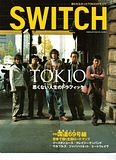
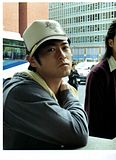
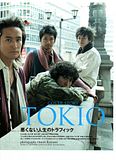
photography Omori Katsumi
TOKIO
No-so-bad Life Traffic
Everyday, TOKIO travels all over Japan, from North to South, from East to West.
Their appeal is none other than the appeal of their character, which anyone can understand and everyone living in all the different places of Japan likes.
They are always doing their best and looking ahead. And they face their music with that same stance. Their photoshoot is at the starting point of National Highway 1: Nihonbashi.

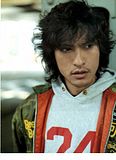
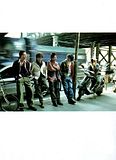
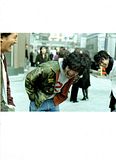


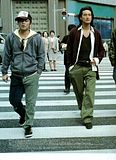
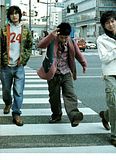
5 Destinies on the Road
Text: Aoki Yusuke
A day in December. The weather forecasted Tokyo's first snow of the season. The five members of TOKIO gathered at Nihonbashi. It didn't snow after all. The rain that fell in the morning lifted. As the sun came out, the cold and the wind strengthened. It was that kind of day.
Black vans arrive, one after another, at the meeting point. After finishing up with hair and make-up, Yamaguchi Tatsuya, Kokubun Taichi, and Joshima Shigeru climb into the location bus. Matsuoka Masahiro and Nagase Tomoya follow. Perhaps answering our request that this photo shoot be close to their everyday look, it doesn't take much time for them to get ready.
When the five meet, they smile and walk together across the crosswalk at Nihonbashi-Mitsukoshimae. "When I went to the village (DASH Village) yesterday, it was covered with snow." "Yesterday, I..." No one actually initiates the conversation. The photo shoot hasn't started yet, but they smile as they walk together.
Matsuoka, face glowing, leads the others across the crosswalk. You can see the faces of the people on the streets and the people waiting for the signal change into surprise as they see the five of them. Among the older salarymen and housewives of Nihonbashi, the presence of these five was a huge event.
Real Image Idols
The starting point of National Highway 1: Nihonbashi. From the time when the road was called the Tokaido, this place was the center of distribution. Now an expressway runs above Nihonbashi and there is no trace that this was once the starting point of all roads.
For example, from Nihonbashi to Osaka, if you use the Tomei Expressway, you'll get there in about six hours. Using the same car, if you go on National Highway 1, it will easily take you over 12 hours. You'll get stopped by signals constantly. You'll get stuck in traffic jams. A stranger's misfortune that you don't want to see might catch your eye.
In an age of airplanes and the Shinkansen, no one, besides long distance deliverymen, makes the eccentric drive, but if you did, you'd understand. When you take the national highway, the scenery and landscapes of each place and the lifestyles of the people who live there will call out to you one after another like a map brought to life. And above all things, if you drive the national highway, you will get to your destination without fail. There is no place in Japan, as long as it isn't kept away by the ocean, that can't be reached from here, Nihonbashi.
I felt each of the five members of TOKIO have a strength and certainty of their identities like the national highway. If you liken the otherworldly "idol" world to the expressway, you'll understand. Just like the Metropolitan Expressway that runs right above Nihonbashi, the things of different places don't call out to that road. Eleven years since their debut, TOKIO has come across many obstacles like signals and traffic jams, but they've kept running.
They have traveled their road all over Japan through their work while interacting with all the different types of people who live there. They've held onto their real image style that they are themselves and not faking it.
Joshima: It's not intentional. It's a feeling. Maybe I should say unconscious.
Nagase: It's simply that five people like this came together in a good way.
Yamaguchi: It's easy. Being with people like this. If it was conscious, I'd probably get tired out. And while we have our differences, this is normal for us. And we all have a feeling that to try to look cool, isn't cool.
You find the "Guys" vibe that runs through TOKIO is like what you find within school sports clubs or an all boys school.
It's like reading a boys comic called "TOKIO." The character of each member is in fine balance with the others, just like on TV. When you meet them, that image doesn't change. So much so, that you'll be taken aback by their lack of pretension.
Kokubun: It might be that we're put off by doing things with women's reactions in mind. Though that first year or so after we debuted, we wanted to be popular with the girls (laughs). That is what our sempai, HikaruGENJI were, with the girls screaming after them. Doing stuff like flying in on a helicopter to go to Seibuen. We originally had that in mind when we became idols, but we didn't have any popularity. It was like, "Hey, I'm riding the train like normal people." But now I think we're less worried about the girls and moving towards wanting to be liked as people, even by guys.
Matsuoka: We're an izakaya band. An izakaya's a place where you actually pay money to eat something you can eat at home, right? But it's good because you're eating it there. It's that kind of distance. Because TOKIO has a familiar feel, people watched us. But what we were going for was something different. Sorry (laughs). We wanted to be more. More like our sempai. At first.
Why we can't give up TOKIO
You can't say TOKIO wasn't popular when they debuted in ’94. Their debut single 「LOVE YOU ONLY」 had a record sale of 500,000 and in only less than three months, they appeared on Kohaku Utagassen. For a normal band, to be carrying the expectations of their record company, there couldn't be a better start.
Joshima: Looking from the normal point of view of major bands or artists, the way we were seen as a band of Johnny's idols was different. In that sense, while we felt that we were a band, artists, there was a gap between that and society's opinion. Although looking at the records, there was no such thing. That gap was a definite problem.
Nagase: We were expected to get number one.
Matsuoka: That's the way it is. We were scared because that's the way it is being in Johnny's. So, we debuted. Record Taisho, Something-or-Other New Artist Award. We're the only ones in the history of Johnny's without something like that.
The music shows that supported the times of the 80s idols were already gone and the band boom was over for quite a while. With the image of the shining "idol" like their sempai etched in their minds, TOKIO debuted as a band. The mass media of the 90s were after an "idol" who was "selling" simply based on their record sale numbers. Then came the time of idols whose "characteristics" worked across genres.
Matsuoka: We experienced a lot of things, but we started to become tired of trying to be something, and we realized that it didn't fit us. And while we worried that we weren't selling, new areas in entertainment started getting attention and we started to do variety shows and acting……not bound to the image of an idol, it felt good to say we do variety shows and we're a band. All of us. It brought out our motivation. We didn't bring it out. And as it was brought out for us, we each gained our own motivation.
Taichi: We're having fun.
Yamaguchi: If we're going to do work, it's better to enjoy working.
Nagase: Also, we all like to create things. Whether it's through drama or variety. Or music. That's why it's interesting. That's where we can express ourselves. There's something there that we just can't give up.
Among the TV shows that determined TOKIO's popularity, there was a popular show where a troubled youth set his life straight through boxing. The drama that unfolded in this show: the sorrow of those who fail, the anger of those who are misunderstood, the weakness of those who run away from pain they've never experienced. It's difficult even now to forget, the five of them standing witness, without the need for words.
Especially between men, there is a mental exchange that happens without words. When you touch the honest emotions of these five people with the conviction of their personalities, you can see it. What is this identity that these five find to be the source of their strength?
Nagase: We didn't start off well, so that actually took a weight off our shoulders. The burden. And that became a reason we could do things like variety shows, and we do our own dramas, of course, and variety shows, and music. Look around the world and you won't find another band that does this much in so many fields. Even though I say it myself, it's what's amazing about us; it is part of our pride. That is what TOKIO is.
Matsuoka: Because there is TOKIO, this is my opinion anyways, it's easy. We have an escape. I can get overwhelmed with solo work, but because TOKIO is there, it's easier. Like TOKIO is my hometown, or my house is TOKIO, and because of it, I can relax and do solo work. Maybe it's easier to understand if I say it's like the happiness of having a place to call home.
Kokubun: Each of us can do solo work because TOKIO is doing well. If we don't do the TOKIO part seriously, we won't be able to work on our own. Whether it be music or variety, if we do our best as TOKIO, we can do solo work. There are a lot who say they like us as a group more than on our own and I think that's important.
Joshima: TOKIO is, therefore I am. No, no, forget the Leader part of it (laughs). That's how I feel. Not Joshima Shigeru, but TOKIO's Joshima Shigeru.
Yamaguchi: It's important that we keep going as the five of us. Above all things. It's very important.
The road that extends before our eyes
They walked from Nihonbashi to Eitai-dori. Nagase and Matsuoka walk together and, at a distance not far and not close, behind them, walk Joshima and Kokubun. Yamaguchi goes back and forth between them. They wear carefree smiles on their faces and you can feel their warmth.
Of course, while walking National Highway 1, no one thinks about how if they keep walking this road, they will reach Osaka. Turning right at the Nihonbashi signal, they turn from Eitai-dori and walk towards the Imperial Palace. The sunlight reflects off the buildings and there are no shadow-like shadows among the office buildings of the Marunouchi area.
But under the JR railway overpass ahead, the shadows were dark as if, just there, time had stopped. This overpass and Eitai-dori look like any other overpass, but it is a devil's pass for trailer drivers. It is only 4 meters high, so if they are pulling sea-shipping containers that are 4.2 meters high, they won't get through. But if the container is packed full and weighed down, then there is a possibility that a 4.2 meter box will make it. When veteran drivers are in a hurry, to use this trick is part of their courage.
The weight felt through the axel is how to judge if the box is low enough and because experience is the only guide to get through, it is the skill of a veteran. While watching each take their individual shots there, I suddenly wondered if the members of TOKIO would take such a chance.
While they wouldn't do it for the sake of their pride, if there was no other choice, if they had something they needed to protect.... When the thought entered my mind, I wanted to laugh. Not because it was funny, but because I knew the answer.
TOKIO has a presence that anyone would imagine to be in reach. While it might be an illusion created by the power of mass communications, that closeness is not imagination, but something of substance.
Cheers of “TOKIO!” came from a passing tour bus. They were some lucky students on a school trip to Tokyo who had the fortune of running into TOKIO. Joshima notices and waves back. Above the tour bus window, the ceiling of the overpass has countless deep scars.
I hope they continue on their road as the five of them. Not to say "Women for a moment, Friends for a lifetime" but, even as they continue their solo work and build families, for some reason, I want for them to continue to feel their fate that they will be "these five." I hope from the bottom of my heart for a band I like to be that way.
Nagase: That's probably the best and it's what everyone wants.
Taichi: It can be in small places, even if we can only play three chords, we still want to play concerts.
Nagase: Even if we can only play three chords, it would be a melody that only TOKIO could play.
Kokubun: And sooner or later someone would realize that we're only playing those three chords (laughs).
Nagase: Simple is best. If we could keep going with that, now that would be impressive. I want to be a band with that much confidence. Without good substance, things won't hold. We can be that kind of band if we keep going.
Nagase and Kokubun talk with conviction. They always have an image of themselves in the future. When I ask about their musical growth over these eleven years, they frown a little and say it's slow, but, they add, that is also TOKIO.
Over eleven years since they debuted, TOKIO's music, while having a marketable pop face, holds the passionate rock inside and lines up the manifold possibilities. While you can imagine the conflict, at the same time they have a unified idea that creates an image of themselves in the future playing "a melody only TOKIO can play."
Kokubun: I can see that we're headed in the same direction when we're recording. It's not something that is created, but something like eye contact, we all think, "let's go that way." And somehow we do.
When faced with a road, everyone has an image of the destination before they start. Only then can you begin to walk that road. Even if it just imagination, without it, we can't even speak.
Standing on National Highway 1 that eventually reaches Osaka, then changes its name and continues to Kyushu, I wanted to see their concert. Maybe it's because I heard their tour would start soon or maybe it's because this national highway connects to all of the places TOKIO would soon visit across the country.
To meet their future, and themselves who believe more in tomorrow than yesterday or anything else. To test out the road before them that continues even further.
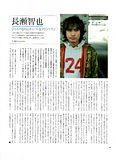
Nagase Tomoya The wild yet cute frontman.
While being the youngest member and still loved by the others, he is the frontman of the band, TOKIO. What are the roots of these two faces?
Text: Ino Shin
Nagase Tomoya spreads his wild yet cute appeal as an actor in TV dramas such as, "Ikebukuro West Gate Park" and "Tiger and Dragon" and he worked with Kudo Kankuro on the movie "Mayonaka no Yagi-san Kita-san."
Nagase's character, which adds reality to his roles, like the "Yakuza yet Rakugoka" in "Tiger and Dragon," also says a lot about his position in TOKIO.
In other words, while he is "TOKIO's frontman who ignites the other members like a carried-way fuse," he is also "the youngest member, still loved by the others." He has two faces. Nagase talks about the roots of this individuality and what he thinks about TOKIO’s future.
The source of things getting carried away is usually me.
It starts from me and infects everyone else. I guess I'm the type that causes that kind of thing. I've always done what I wanted and the other members have always called me on it or praised me.
With all the different groups out there, TOKIO is, to put it simply, not one of the conventional ones. In a way, we have a stupid, "typical guy" side to us and we get carried away. It's the stuff that guys would like. It's probably the reason that younger guys tell us "Yeah, I understand. That's cool stuff." It's something that only TOKIO has.
I realized that when I was about 23, 24.
I don't know but, when I go shopping in Shibuya or Harajuku, I still get asked by girls to shake their hands, but there are more and more guys, and these past 2, 3 years there are days where I think "I only got talked to by guys." While thinking "girls would be better" (laughs), as I asked myself "how did this happen," that's when I think figured it out. Of course there is the influence of dramas too.
There's lots of pretty words rolling around, but the stuff in reach tends to be stupid. I've always like that kind of stuff more.
I've been into bikes and skateboards since junior high. I only did things that boys did. Of course I like girls, but it's hard to let go of the fun of hanging out with just guys. I might have hung out with boys because I only have sisters. When there are girls around, it's a bit of a pain because you have to look cool (laughs).
Where TOKIO is going from here? It'd be good if we keep growing, like we are now. We don't look for change. If we looked for change, then it would be something someone else is doing. And we're already walking a road that only we can walk, so it's good to keep walking it. I think that's why we've gotten this far in eleven years.
The new single "Ashita wo Mezashite" is a song I wrote. It's the first song written by a member to be released as a single, but we have songs written by the members in our albums, so this is just an extension of that. The way I write songs hasn't changed much.
But considering my personal thoughts on TOKIO's direction, I'm really happy that the song I wrote as a song I can sing now, a song I want to sing, a song that's fun to play, was chosen.
This is my own interpretation, but there is probably an image of what the general public thinks is "TOKIO." We can't and shouldn't throw that away. It's something that we've built up and it's important. But it's also wrong for us to be held down by it and stay there. We want to include everyone and take them all to a different place.
I've been told that I have an advantageous position because I am the youngest of the group, while that may have been true in the past....... Well, I guess I still do. Everyone messes with me, of course it's not as much as before, but I can feel the love. And there are times I am really happy about it. It's......I don't know, maybe it's just me.
It just feels good being with the members. Like being wrapped up in a warm blanket.
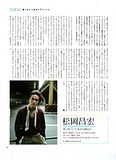
Matsuoka Masahiro It's fun because you're under pressure
It is natural that he is the director of the PVs. At the furthest back of the stage, he senses the feelings of the members that can’t be put into words.
Text: Sakamoto Asato
While comical yet sensitive characters have become his trademark role in recent dramas such as "Tengoku ni Ichiban Chikai Otoko," "Nurseman" and "Manhattan Love Story," Matsuoka Masahiro in TOKIO is an all-or-nothing passionate man. Having watched the other members from the furthest back on the stage, he has the clearest and most precise idea of what TOKIO is. He says, "The best seat in the house is the drum set where I sit." He became the director of the PVs, "because as the drummer, I know just how cool everyone really is." Just as "a man’s back tells tales," drummer Matsuoka Masahiro talks about the backs of the band TOKIO.
We were just talking about what TOKIO would be like if we kept going another ten years. And looking back at these past eleven years, it's been eleven years of finding more things to we want to try. After having done eleven years, we want more. On the other hand, because we're at a good point right now, we can afford to do things......for me, now is a pretty half-assed time. Maybe it's just what the world calls the thirty-somethings. I'm twenty-eight now and in January I'll be twenty-nine, so one more year until I'm thirty, right? Maybe I'm just panicking a bit.
There is a cold part of me, so while there are times when I am "TOKIO, TOKIO," there are also times when I don't like TOKIO. To tell the truth, to say that TOKIO is always on my mind would be a lie. But if there was a Matsuoka Top Three Something, there is no doubt TOKIO would be one of them. Whenever I do something, I put the paint "TOKIO" onto the palette that is myself.
We’re often called a "special" band, but I think we're the same as everyone else. We sent out our resumes and got into Johnny's and different from what we wanted, were made into a unit called TOKIO. There are salarymen who send out their resumes and while getting into the company they wanted, don't get placed in the department that they believe best suits them, right? Same thing. And for TOKIO, we changed after we started to go on stage together. Dancing behind our sempai, we realized "If we don't start thinking like a group, we're the ones who get embarrassed."
The Nagase that I think of, while not living in the city 100%, I'm a country boy anyways, only lives in Tokyo. A place to work and a place to live. Tokyo is my home town, and the Matsuoka Masahiro that everyone knows was created in Tokyo. There was nothing over there. There was nothing and it had nothing. Nothing to pick up. People say Tokyo is cluttered and always under pressure, but that's what's makes it interesting, right? Not just Tokyo, but the world.
It's been 17 years since I entered the entertainment business and if I were to name my biggest stroke of luck, it would be that I got into Johnny's. That connects to everything. And none of it was ability. It was more like I wouldn't take it if I got in because of ability. That was luck. Maybe I should say it was chance. You could say, I got in because I lacked ability.
I never sang or danced before, but I was suddenly handed a script and told "Off you go!" (laughs). I had no idea what to do, but, but I did it, and I've gotten here. So when people tell me "My dream is this or that," I think "So then do it." If you have enough time to be talking about goals, just do it. If you want to get into the entertainment business, get in. I got in. And, if it doesn't work out, give up. I'm all about results and I ask other people to be. But the members of TOKIO don't talk about things like that. They are all guys who "do it."
And so I often wonder if I were to die, how much of a topic would it be. If you say I'm a lonely person, that might be true. I'm here, so look at me. Remember me. That's the reason I entered this business. If I go on TV, I'll be famous, and then maybe people will understand me. That's why I want to leave an album that Matsuoka Masahiro lived, that there was person called Matsuoka Masahiro. And not an album of pictures or footage, but I have a strong desire to remain in everyone's memories. Everyone's "Memories" and "Records." Maybe I try to stand out because I am the ultimate lonely man. Because I feel lonely and I am alone. Because I want to be noticed, I do a lot of things in front of people. It just happens to be in the form of music and dramas.
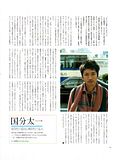
Kokubun Taichi The person I want to become, the five that I want us to be
The boy whose life changed because his older sister sent out his resume, now he is in his eleventh year. Just as if playing the keyboard, he examines each note as he plays out his future as well as the future of the five of them.
Text: Uchida Masaki
"In anycase, this has been a fulfilling year."
Just as he said, 2005 was a turning point year for Kokubun Taichi.
Sharing lead roles with Domoto Tsuyoshi, "Fantastipo" is his first movie with a lead role. His performance expressed the light and dark sides of popstars. For the TV drama "Hiroshima-Showa 20, August 6th", he shaved his head to get into the mood for a serious war drama. In his late night TV shows, he's talked with famous people from different circles and developed his speaking skills.
From within his turning point, Kokubun talks about the significance of being a member of TOKIO and the ultimate TOKIO road.
I was thinking. We still get screams from fans, like at the Nihonbashi photo shoot. And it really makes me happy. I think, "Hey, I'm so cool!" (laughs). But recently, I want to change the reason for the screams. I'll say this at the risk of being misunderstood, I don't care about things like the details of what my hair looks like any more.
Last year, when I was in a drama called "Hiroshima~," I cut my hair. I wanted to do it. I didn't have many scenes, but if I can add to the feel of the time period, I'll cut as much hair off as I can. Of course if I'm told that the camera is rolling then I am concerned about how I look, but I'd like the screams to be more about the content of what I say and the person I am.
Because of the TV shows I'm in, I get a lot of chances to meet a lot of different people. I am aware of how much meeting different people makes me grow as a person. And I visit places all over the country because of (Tetsuwan) DASH. Including the small islands, I don't think there's a prefecture I haven't been to (laughs). If you think about it that way, with all the people I've met and the traveling I've done, I might have the experiences of a 60 year old. But I don't have the description abilities of a 60 year old, so I can't express those experiences well. This is the problem I've been battling with lately.
For example, you see something beautiful. But there are more words to describe a beautiful thing than just "beautiful," right? I've finally become interested in that kind of virtue of the Japanese language. That's why, while I'm always into soccer, now I'm also into dictionaries. If there is a word I don't know, I look it up right away. Meeting Miwa (Akihiro)-san is a big part of this. Miwa-san taught me that "Culture is to make the most of knowledge in everyday life."
I don't want to get away with things because I'm an idol; I want to be acknowledged as an adult. Being on TV this much, I give off a "show biz" aura even if I don't want to (laughs). Different from that, right now I want to be a man whose normal aura is cool. But TOKIO is the base. Because TOKIO is there, this awareness was born.
OK, so, there was a time about 3, 4 years after we debuted when I would blurt out all the arrangement, stage direction, and song order ideas and let the other members figure out the details. I felt a sense of responsibility and pressure that someone had to do it and my tone was harsh. I started to fall into a self-loathing and one day I stopped saying anything all together. And then a few months later, I was drinking with Yamaguchi-kun and he said, "Why aren't you saying anything? Everyone's waiting to hear what you have to say!" I felt like I had been saved and just wailed and cried right in front of him.
The reason TOKIO is said to have a "familiar presence" is probably because the five of us have been through a lot. We couldn't get number one on the charts and betrayed a lot of expectations (laughs). But because of that, I think we realized a lot of things early on.
What do I want as the five of us? What else? To always be singing and playing in front of our audience. It's a theme that has never changed for me. Japan has a lot of bands that break up, right? I want us to always be together. Even if people say we don't look cool.
Also, interviews are important. I don't look back on the past year or past ten years in my time off. I don't look back. When I read today's interview ten years from now, I want to think "Who the hell does he think he is?" (laughs). But it's so much better than thinking "I should have talked about it," right? So interview me again sometime. I'll tell you lots of things.
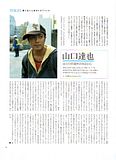
Yamaguchi Tatsuya Because I have a place to belong
He is like the "father" of a household. He doesn't bring everyone together or say his opinion, but he needs to be there. The warm and strong person who is Yamaguchi Tatsuya.
Text: Kawaguchi Miho
Yamaguchi Tatsuya has a distinct feeling of stability. Maybe it's the composure of being thirty four. Maybe it's from working with nature at DASH Village. Or maybe it's from being the bass in a band, in charge of rhythm. The entertainment business is filled with intense competition, but Yamaguchi Tatsuya has the kind generosity of a person with deep set roots.
It probably has something to do with his lifestyle. He started surfing five years ago and it's been three years since he moved close to the ocean. Now he works and lives are in different places. He says work has become much more fun because of it. His solid enjoyment of work and living eases the hearts of the members. It's appropriate to say Yamaguchi Tatsuya is causing a good change to TOKIO.
It's been eleven years since we debuted. Everyone has had their own jobs and grown in their own way and being TOKIO. It's the result of everyone enjoying work and unconsciously doing what they can to push TOKIO forward. So, what is my part in it all? I don't really know. But, rather than a position of "Yamaguchi, we want you to do this part" or "Yamaguchi will do this, so we'll put him here," I would like it if my "presence" is important. With me being here, everyone can do things freely, feel safe.......I don't know if it's like the "Father" of a "household," but it would be nice if my presence makes everyone feel at ease. I'm not the type to go do things for someone, but if someone is in trouble I'll do what I can to help. Like a father from Japan's good old days......that kind of warmth.
I don't like working too hard. If you work too hard, you'll mess up everything. And you get tired out, right? I don't like that. That doesn't mean "not working hard," but to not do stuff like forcibly going against things, going too far ahead, changing the flow. In other words, you should think about what needs to be done now and do what should be done now. If you can't even do what you are doing now, don't go ahead. That kind of attitude probably has to do with how I don't want to be floating around. I don't like going from one thing to another. That's probably why I started to look for a place I belong. The surfing I started five years ago was one of the catalysts. Around that time......it was about five years since we debuted, when we changed record companies and people started to recognize us through variety shows; it was also a time we could do what we wanted to do. Until then, we were sprinting. Without time to think, we released CD after CD and trying out different TV shows. But gradually our positions and the way we make shows became our own. It was when we learned how to create things on our own. So if I had the chance to surf before, I probably mentally couldn’t do it.
After I started surfing, I've become really calm. Before, I went out drinking and had fun with my friends. But now, I've become a morning person. And after I moved closer to the ocean, I surf in the morning and then head to work. It suits me. I've found a good hobby.
Unless something extreme happens, I'll keep surfing. Hobbies are something that you can keep doing. But with this job I don't know what will happen tomorrow; I might not have a job tomorrow. It's not a stable job. But if I want to quit surfing, I can quit and if I want to do it until I die, I can. It's nice to have at least one thing like that. It's a place to return to. Depending on the person, it might be a place to run away to, but because it's there, I do my best at work and work is fun.
Each of us in TOKIO has a different sensibility. Maybe that's why I don't have to psych myself up for things we do as TOKIO, I mean, everyone's having fun as TOKIO. That's why we don't have a goal for what we want to be as TOKIO. If we have something like that, it will mean we have to go that way. "To do something as these five guys" is more important. And have fun.
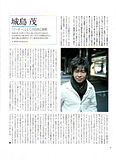
Joshima Shigeru The pride and resolution of being "Leader"
While being the one to pull the band for 11 years since its creation, without ever bringing that to the front, he is always watching from one step back. The resolution of the cheerful, popular Leader Joshima Shigeru.
Text: Sugawara Go
"Leader! Leader!" The faces of the members calling to Joshima Shigeru are always smiling merrily from their hearts. The smiles that the four show him express Joshima's position within TOKIO more clearly than anything. Not the image of the composed, trusted leader, he's more like the great sempai that all the kohai make fun of in clubs at school. That is probably the typical image of Leader Joshima Shigeru. But on the other side of his character, he is also the one who, for eleven years, continued to watch TOKIO with a more severe eye than anyone. "I graduated from a commercial high school. So my thoughts wander over to marketing and things." As he laughed wryly, "TOKIO's Leader Joshima Shigeru" quietly began to talk.
When thinking about a group's achievement, the first thing is music sales, next TV show ratings, the ratings of variety shows and dramas, and then there's concert audience percentages......it's a lot of numbers. It may sound shallow, but the reason I think about these things is because through them, we know if we are needed. Without the demand, we aren't needed, and so we need to be well established. If you look at another way, because we were established in that sense, we were able to continue for eleven years. That's why variety shows are essential to TOKIO and we changed record companies and got a number one single and our commemorative tenth album got number one......it's important to make these kinds of accomplishments. For TOKIO to continue, not to play the bad guy, but at times I purposely said harsh things to the members.
Ever since we received the name TOKIO, I've been watching TOKIO from one step back. Of course I am part of the group, but at the same time I felt I needed to produce the group TOKIO and I've had many discussions with Johnny-san. We talked to each other before about wanting to make a group that exists like this. These were secret discussions and I've never even told the members. That's why, in my mind, our president's influence is very important to TOKIO. Though I can't be full of myself to say what I did in that process (laughs). But one thing I can say is that I love this group more than any fan, more than anyone. And I love the members maybe more than their own parents. That's why my mission......if I have any right as Leader, is to make sure this group never breaks up. If TOKIO were to ever break up, I would no longer be Leader Joshima Shigeru, but Joshima Shigeru, a talent in Johnny's. If that were to ever happen, I plan on leaving the entertainment business. Because TOKIO is, I am. Because the members are there, I am. I take on the role of TOKIO's Leader with that kind of resolution.
There used to be the category of the veteran "Johnny's Idol." And we were aiming to stand in the same glorious spotlight as Shonentai and HikaruGENJI. But when we debuted, the music ranking shows like Best Ten and Top Ten were over and it was a hard time for singers. Hit Studio was gone too; all of the star-staged music shows we looked up to as kids were gone. We thought as long as we keep working as singers, as a band, it would be all right, but we couldn't make a living on just that. And then we found variety shows starting with "The Tetsuwan DASH" and started to work as actors while we continued to work as a band, and we would take up anything else that had a market for us, and before I knew it while I felt happy on the stage holding my guitar, I felt just about as happy holding a hoe, plowing the fields at DASH Village (laughs).
It's different from the ideal place we were headed towards in the beginning......but to say that this place isn't ideal would be to deny everything we are and I don't want to do that. But the point is, what we first imagined was the image of the 80s idol. We didn't turn out that way, but so what (laughs). We've found a different way to shine, even if we're covered in mud, or smell like dust, I love the work we do when the five of us get together. I would love for us to be like this after ten, twenty years.

Words for you The words they can't say face to face, they can say them here. The relay talk TOKIO gives to you.
Nagase Tomoya → Yamaguchi Tatsuya
Yamaguchi-kun is a classic bassist. Like all of the bassists of my favorite bands, he stands one step behind, between the drums and the frontman, watching them both as he plays. When everyone gets more and more into things, he takes a step back watching everyone, calmly says his opinion and makes his decision. He holds a position where he watches over everyone. For example at a concert, the guitarist goes into his own world, the vocalist has a call and response with the crowd, the drummer keeps the rhythm, the keyboard thinks about lots of things and adds treats. During all of this, the bass plays, watching over everyone. I look up to that. A presence that is vital to our group. It's a role that the other four can't fill. He's already 34, so he's an adult, but he does what he likes.
Yamaguchi Tatsuya → Kokubun Taichi
About 5-6 years after our debut, Taichi really changed into an adult. He's a hard worker and so serious. And so he studied a lot about music and he really changed. I used to wonder what happened to that cute Taichi from the Junior days. But recently when I look at him, I'm reminded of the Taichi from back then. It feels like he's returned to that Taichi just a bit. How can I put it?.....it's like after 11 years, he's come full circle. Taichi is, to put it simply, easily carried away. He's a kid, naive, and light-hearted. A kind of guy who spoils things. He hates tension, so he builds things up and makes a mess of it all. But the first 5 years or so after we debuted, now that I think about it, was a time when he tried too hard. And now he's more relaxed and he's able to be himself. His talents come out on TV just as they are.
Kokubun Taichi → Joshima Shigeru
"The person of the invisible balance. For example, someone says something. He's a person who can respond some times and other times watch the conversation unfold. Normally a "leader" is in the center, pulling everyone, like the boss of a troupe. But he's different; he is a leader who reads the air and guides us without us realizing it. Maybe it's his age. He's an adult. I've even felt that he's a person who could die for someone. You don't see that kind of person everyday. When times were hard for TOKIO, even when the rest of us were thinking, "Maybe this is the end," he said "Let's try a bit more." He really is so cool, and it's amazing that he doesn't normally show it. My image of him has changed from my original impression. Because his debut was on the late side in Johnny's, he was under a lot of pressure, really tense. He had the strongest desire for us to work only as a band. Though now he's surprisingly well adjusted to variety shows (laughs)."
Joshima Shigeru → Matsuoka Masahiro
"He's the only one in the group with a different blood type. Four of us are Type O, he's Type A. Maybe that's part of it, but he's the only one of TOKIO with common sense. He's like Zhuge Liang in The Chronicle of Three Kingdoms. The calm advisor. He is TOKIO's brain. With his own original point of view, he looks at TOKIO from a different angle, seeing things that everyone else doesn't. He's the one keeping together the members who are all off doing their own thing. The "leader" in the shadows, the "fixer" (laughs). And he's different from the image most people have of him. They may think of him as a sunglass-wearing, pretentious guy, but he is very sensitive and the most passionate of the members. He’ll never show it in front of anyone, but when he's drinking he's talking about the other members.....that's what kind of person he is. In truth, he is the most warmhearted man."
Matsuoka Masahiro → Nagase Tomoya
"If Nagase wasn't our vocal, I don't think we would have performed. Partly because he's the youngest, he's still adorable. But when you see his coolness break through the cuteness, the shock of that is indescribable. That's why I became director of the PVs. Because I always believed Nagase's coolness is something more. Also, he's often called a "ditz" but that acts as TOKIO's neutralizer. He says something, we make fun of him, but he keeps laughing on his own....it's part of TOKIO's happiness, and someone always comes out to make him laugh more. And, when Nagase stands on stage, there are times he has an expression on his face that he doesn't normally show. It's something even we can't touch. Because that's his time to be free to be "himself." Seeing that expression on his face and feeling that it is a wonderful thing becomes my energy for the next thing. And in that sense he is TOKIO's engine."



photography Omori Katsumi
TOKIO
No-so-bad Life Traffic
Everyday, TOKIO travels all over Japan, from North to South, from East to West.
Their appeal is none other than the appeal of their character, which anyone can understand and everyone living in all the different places of Japan likes.
They are always doing their best and looking ahead. And they face their music with that same stance. Their photoshoot is at the starting point of National Highway 1: Nihonbashi.








5 Destinies on the Road
Text: Aoki Yusuke
A day in December. The weather forecasted Tokyo's first snow of the season. The five members of TOKIO gathered at Nihonbashi. It didn't snow after all. The rain that fell in the morning lifted. As the sun came out, the cold and the wind strengthened. It was that kind of day.
Black vans arrive, one after another, at the meeting point. After finishing up with hair and make-up, Yamaguchi Tatsuya, Kokubun Taichi, and Joshima Shigeru climb into the location bus. Matsuoka Masahiro and Nagase Tomoya follow. Perhaps answering our request that this photo shoot be close to their everyday look, it doesn't take much time for them to get ready.
When the five meet, they smile and walk together across the crosswalk at Nihonbashi-Mitsukoshimae. "When I went to the village (DASH Village) yesterday, it was covered with snow." "Yesterday, I..." No one actually initiates the conversation. The photo shoot hasn't started yet, but they smile as they walk together.
Matsuoka, face glowing, leads the others across the crosswalk. You can see the faces of the people on the streets and the people waiting for the signal change into surprise as they see the five of them. Among the older salarymen and housewives of Nihonbashi, the presence of these five was a huge event.
Real Image Idols
The starting point of National Highway 1: Nihonbashi. From the time when the road was called the Tokaido, this place was the center of distribution. Now an expressway runs above Nihonbashi and there is no trace that this was once the starting point of all roads.
For example, from Nihonbashi to Osaka, if you use the Tomei Expressway, you'll get there in about six hours. Using the same car, if you go on National Highway 1, it will easily take you over 12 hours. You'll get stopped by signals constantly. You'll get stuck in traffic jams. A stranger's misfortune that you don't want to see might catch your eye.
In an age of airplanes and the Shinkansen, no one, besides long distance deliverymen, makes the eccentric drive, but if you did, you'd understand. When you take the national highway, the scenery and landscapes of each place and the lifestyles of the people who live there will call out to you one after another like a map brought to life. And above all things, if you drive the national highway, you will get to your destination without fail. There is no place in Japan, as long as it isn't kept away by the ocean, that can't be reached from here, Nihonbashi.
I felt each of the five members of TOKIO have a strength and certainty of their identities like the national highway. If you liken the otherworldly "idol" world to the expressway, you'll understand. Just like the Metropolitan Expressway that runs right above Nihonbashi, the things of different places don't call out to that road. Eleven years since their debut, TOKIO has come across many obstacles like signals and traffic jams, but they've kept running.
They have traveled their road all over Japan through their work while interacting with all the different types of people who live there. They've held onto their real image style that they are themselves and not faking it.
Joshima: It's not intentional. It's a feeling. Maybe I should say unconscious.
Nagase: It's simply that five people like this came together in a good way.
Yamaguchi: It's easy. Being with people like this. If it was conscious, I'd probably get tired out. And while we have our differences, this is normal for us. And we all have a feeling that to try to look cool, isn't cool.
You find the "Guys" vibe that runs through TOKIO is like what you find within school sports clubs or an all boys school.
It's like reading a boys comic called "TOKIO." The character of each member is in fine balance with the others, just like on TV. When you meet them, that image doesn't change. So much so, that you'll be taken aback by their lack of pretension.
Kokubun: It might be that we're put off by doing things with women's reactions in mind. Though that first year or so after we debuted, we wanted to be popular with the girls (laughs). That is what our sempai, HikaruGENJI were, with the girls screaming after them. Doing stuff like flying in on a helicopter to go to Seibuen. We originally had that in mind when we became idols, but we didn't have any popularity. It was like, "Hey, I'm riding the train like normal people." But now I think we're less worried about the girls and moving towards wanting to be liked as people, even by guys.
Matsuoka: We're an izakaya band. An izakaya's a place where you actually pay money to eat something you can eat at home, right? But it's good because you're eating it there. It's that kind of distance. Because TOKIO has a familiar feel, people watched us. But what we were going for was something different. Sorry (laughs). We wanted to be more. More like our sempai. At first.
Why we can't give up TOKIO
You can't say TOKIO wasn't popular when they debuted in ’94. Their debut single 「LOVE YOU ONLY」 had a record sale of 500,000 and in only less than three months, they appeared on Kohaku Utagassen. For a normal band, to be carrying the expectations of their record company, there couldn't be a better start.
Joshima: Looking from the normal point of view of major bands or artists, the way we were seen as a band of Johnny's idols was different. In that sense, while we felt that we were a band, artists, there was a gap between that and society's opinion. Although looking at the records, there was no such thing. That gap was a definite problem.
Nagase: We were expected to get number one.
Matsuoka: That's the way it is. We were scared because that's the way it is being in Johnny's. So, we debuted. Record Taisho, Something-or-Other New Artist Award. We're the only ones in the history of Johnny's without something like that.
The music shows that supported the times of the 80s idols were already gone and the band boom was over for quite a while. With the image of the shining "idol" like their sempai etched in their minds, TOKIO debuted as a band. The mass media of the 90s were after an "idol" who was "selling" simply based on their record sale numbers. Then came the time of idols whose "characteristics" worked across genres.
Matsuoka: We experienced a lot of things, but we started to become tired of trying to be something, and we realized that it didn't fit us. And while we worried that we weren't selling, new areas in entertainment started getting attention and we started to do variety shows and acting……not bound to the image of an idol, it felt good to say we do variety shows and we're a band. All of us. It brought out our motivation. We didn't bring it out. And as it was brought out for us, we each gained our own motivation.
Taichi: We're having fun.
Yamaguchi: If we're going to do work, it's better to enjoy working.
Nagase: Also, we all like to create things. Whether it's through drama or variety. Or music. That's why it's interesting. That's where we can express ourselves. There's something there that we just can't give up.
Among the TV shows that determined TOKIO's popularity, there was a popular show where a troubled youth set his life straight through boxing. The drama that unfolded in this show: the sorrow of those who fail, the anger of those who are misunderstood, the weakness of those who run away from pain they've never experienced. It's difficult even now to forget, the five of them standing witness, without the need for words.
Especially between men, there is a mental exchange that happens without words. When you touch the honest emotions of these five people with the conviction of their personalities, you can see it. What is this identity that these five find to be the source of their strength?
Nagase: We didn't start off well, so that actually took a weight off our shoulders. The burden. And that became a reason we could do things like variety shows, and we do our own dramas, of course, and variety shows, and music. Look around the world and you won't find another band that does this much in so many fields. Even though I say it myself, it's what's amazing about us; it is part of our pride. That is what TOKIO is.
Matsuoka: Because there is TOKIO, this is my opinion anyways, it's easy. We have an escape. I can get overwhelmed with solo work, but because TOKIO is there, it's easier. Like TOKIO is my hometown, or my house is TOKIO, and because of it, I can relax and do solo work. Maybe it's easier to understand if I say it's like the happiness of having a place to call home.
Kokubun: Each of us can do solo work because TOKIO is doing well. If we don't do the TOKIO part seriously, we won't be able to work on our own. Whether it be music or variety, if we do our best as TOKIO, we can do solo work. There are a lot who say they like us as a group more than on our own and I think that's important.
Joshima: TOKIO is, therefore I am. No, no, forget the Leader part of it (laughs). That's how I feel. Not Joshima Shigeru, but TOKIO's Joshima Shigeru.
Yamaguchi: It's important that we keep going as the five of us. Above all things. It's very important.
The road that extends before our eyes
They walked from Nihonbashi to Eitai-dori. Nagase and Matsuoka walk together and, at a distance not far and not close, behind them, walk Joshima and Kokubun. Yamaguchi goes back and forth between them. They wear carefree smiles on their faces and you can feel their warmth.
Of course, while walking National Highway 1, no one thinks about how if they keep walking this road, they will reach Osaka. Turning right at the Nihonbashi signal, they turn from Eitai-dori and walk towards the Imperial Palace. The sunlight reflects off the buildings and there are no shadow-like shadows among the office buildings of the Marunouchi area.
But under the JR railway overpass ahead, the shadows were dark as if, just there, time had stopped. This overpass and Eitai-dori look like any other overpass, but it is a devil's pass for trailer drivers. It is only 4 meters high, so if they are pulling sea-shipping containers that are 4.2 meters high, they won't get through. But if the container is packed full and weighed down, then there is a possibility that a 4.2 meter box will make it. When veteran drivers are in a hurry, to use this trick is part of their courage.
The weight felt through the axel is how to judge if the box is low enough and because experience is the only guide to get through, it is the skill of a veteran. While watching each take their individual shots there, I suddenly wondered if the members of TOKIO would take such a chance.
While they wouldn't do it for the sake of their pride, if there was no other choice, if they had something they needed to protect.... When the thought entered my mind, I wanted to laugh. Not because it was funny, but because I knew the answer.
TOKIO has a presence that anyone would imagine to be in reach. While it might be an illusion created by the power of mass communications, that closeness is not imagination, but something of substance.
Cheers of “TOKIO!” came from a passing tour bus. They were some lucky students on a school trip to Tokyo who had the fortune of running into TOKIO. Joshima notices and waves back. Above the tour bus window, the ceiling of the overpass has countless deep scars.
I hope they continue on their road as the five of them. Not to say "Women for a moment, Friends for a lifetime" but, even as they continue their solo work and build families, for some reason, I want for them to continue to feel their fate that they will be "these five." I hope from the bottom of my heart for a band I like to be that way.
Nagase: That's probably the best and it's what everyone wants.
Taichi: It can be in small places, even if we can only play three chords, we still want to play concerts.
Nagase: Even if we can only play three chords, it would be a melody that only TOKIO could play.
Kokubun: And sooner or later someone would realize that we're only playing those three chords (laughs).
Nagase: Simple is best. If we could keep going with that, now that would be impressive. I want to be a band with that much confidence. Without good substance, things won't hold. We can be that kind of band if we keep going.
Nagase and Kokubun talk with conviction. They always have an image of themselves in the future. When I ask about their musical growth over these eleven years, they frown a little and say it's slow, but, they add, that is also TOKIO.
Over eleven years since they debuted, TOKIO's music, while having a marketable pop face, holds the passionate rock inside and lines up the manifold possibilities. While you can imagine the conflict, at the same time they have a unified idea that creates an image of themselves in the future playing "a melody only TOKIO can play."
Kokubun: I can see that we're headed in the same direction when we're recording. It's not something that is created, but something like eye contact, we all think, "let's go that way." And somehow we do.
When faced with a road, everyone has an image of the destination before they start. Only then can you begin to walk that road. Even if it just imagination, without it, we can't even speak.
Standing on National Highway 1 that eventually reaches Osaka, then changes its name and continues to Kyushu, I wanted to see their concert. Maybe it's because I heard their tour would start soon or maybe it's because this national highway connects to all of the places TOKIO would soon visit across the country.
To meet their future, and themselves who believe more in tomorrow than yesterday or anything else. To test out the road before them that continues even further.

Nagase Tomoya The wild yet cute frontman.
While being the youngest member and still loved by the others, he is the frontman of the band, TOKIO. What are the roots of these two faces?
Text: Ino Shin
Nagase Tomoya spreads his wild yet cute appeal as an actor in TV dramas such as, "Ikebukuro West Gate Park" and "Tiger and Dragon" and he worked with Kudo Kankuro on the movie "Mayonaka no Yagi-san Kita-san."
Nagase's character, which adds reality to his roles, like the "Yakuza yet Rakugoka" in "Tiger and Dragon," also says a lot about his position in TOKIO.
In other words, while he is "TOKIO's frontman who ignites the other members like a carried-way fuse," he is also "the youngest member, still loved by the others." He has two faces. Nagase talks about the roots of this individuality and what he thinks about TOKIO’s future.
The source of things getting carried away is usually me.
It starts from me and infects everyone else. I guess I'm the type that causes that kind of thing. I've always done what I wanted and the other members have always called me on it or praised me.
With all the different groups out there, TOKIO is, to put it simply, not one of the conventional ones. In a way, we have a stupid, "typical guy" side to us and we get carried away. It's the stuff that guys would like. It's probably the reason that younger guys tell us "Yeah, I understand. That's cool stuff." It's something that only TOKIO has.
I realized that when I was about 23, 24.
I don't know but, when I go shopping in Shibuya or Harajuku, I still get asked by girls to shake their hands, but there are more and more guys, and these past 2, 3 years there are days where I think "I only got talked to by guys." While thinking "girls would be better" (laughs), as I asked myself "how did this happen," that's when I think figured it out. Of course there is the influence of dramas too.
There's lots of pretty words rolling around, but the stuff in reach tends to be stupid. I've always like that kind of stuff more.
I've been into bikes and skateboards since junior high. I only did things that boys did. Of course I like girls, but it's hard to let go of the fun of hanging out with just guys. I might have hung out with boys because I only have sisters. When there are girls around, it's a bit of a pain because you have to look cool (laughs).
Where TOKIO is going from here? It'd be good if we keep growing, like we are now. We don't look for change. If we looked for change, then it would be something someone else is doing. And we're already walking a road that only we can walk, so it's good to keep walking it. I think that's why we've gotten this far in eleven years.
The new single "Ashita wo Mezashite" is a song I wrote. It's the first song written by a member to be released as a single, but we have songs written by the members in our albums, so this is just an extension of that. The way I write songs hasn't changed much.
But considering my personal thoughts on TOKIO's direction, I'm really happy that the song I wrote as a song I can sing now, a song I want to sing, a song that's fun to play, was chosen.
This is my own interpretation, but there is probably an image of what the general public thinks is "TOKIO." We can't and shouldn't throw that away. It's something that we've built up and it's important. But it's also wrong for us to be held down by it and stay there. We want to include everyone and take them all to a different place.
I've been told that I have an advantageous position because I am the youngest of the group, while that may have been true in the past....... Well, I guess I still do. Everyone messes with me, of course it's not as much as before, but I can feel the love. And there are times I am really happy about it. It's......I don't know, maybe it's just me.
It just feels good being with the members. Like being wrapped up in a warm blanket.

Matsuoka Masahiro It's fun because you're under pressure
It is natural that he is the director of the PVs. At the furthest back of the stage, he senses the feelings of the members that can’t be put into words.
Text: Sakamoto Asato
While comical yet sensitive characters have become his trademark role in recent dramas such as "Tengoku ni Ichiban Chikai Otoko," "Nurseman" and "Manhattan Love Story," Matsuoka Masahiro in TOKIO is an all-or-nothing passionate man. Having watched the other members from the furthest back on the stage, he has the clearest and most precise idea of what TOKIO is. He says, "The best seat in the house is the drum set where I sit." He became the director of the PVs, "because as the drummer, I know just how cool everyone really is." Just as "a man’s back tells tales," drummer Matsuoka Masahiro talks about the backs of the band TOKIO.
We were just talking about what TOKIO would be like if we kept going another ten years. And looking back at these past eleven years, it's been eleven years of finding more things to we want to try. After having done eleven years, we want more. On the other hand, because we're at a good point right now, we can afford to do things......for me, now is a pretty half-assed time. Maybe it's just what the world calls the thirty-somethings. I'm twenty-eight now and in January I'll be twenty-nine, so one more year until I'm thirty, right? Maybe I'm just panicking a bit.
There is a cold part of me, so while there are times when I am "TOKIO, TOKIO," there are also times when I don't like TOKIO. To tell the truth, to say that TOKIO is always on my mind would be a lie. But if there was a Matsuoka Top Three Something, there is no doubt TOKIO would be one of them. Whenever I do something, I put the paint "TOKIO" onto the palette that is myself.
We’re often called a "special" band, but I think we're the same as everyone else. We sent out our resumes and got into Johnny's and different from what we wanted, were made into a unit called TOKIO. There are salarymen who send out their resumes and while getting into the company they wanted, don't get placed in the department that they believe best suits them, right? Same thing. And for TOKIO, we changed after we started to go on stage together. Dancing behind our sempai, we realized "If we don't start thinking like a group, we're the ones who get embarrassed."
The Nagase that I think of, while not living in the city 100%, I'm a country boy anyways, only lives in Tokyo. A place to work and a place to live. Tokyo is my home town, and the Matsuoka Masahiro that everyone knows was created in Tokyo. There was nothing over there. There was nothing and it had nothing. Nothing to pick up. People say Tokyo is cluttered and always under pressure, but that's what's makes it interesting, right? Not just Tokyo, but the world.
It's been 17 years since I entered the entertainment business and if I were to name my biggest stroke of luck, it would be that I got into Johnny's. That connects to everything. And none of it was ability. It was more like I wouldn't take it if I got in because of ability. That was luck. Maybe I should say it was chance. You could say, I got in because I lacked ability.
I never sang or danced before, but I was suddenly handed a script and told "Off you go!" (laughs). I had no idea what to do, but, but I did it, and I've gotten here. So when people tell me "My dream is this or that," I think "So then do it." If you have enough time to be talking about goals, just do it. If you want to get into the entertainment business, get in. I got in. And, if it doesn't work out, give up. I'm all about results and I ask other people to be. But the members of TOKIO don't talk about things like that. They are all guys who "do it."
And so I often wonder if I were to die, how much of a topic would it be. If you say I'm a lonely person, that might be true. I'm here, so look at me. Remember me. That's the reason I entered this business. If I go on TV, I'll be famous, and then maybe people will understand me. That's why I want to leave an album that Matsuoka Masahiro lived, that there was person called Matsuoka Masahiro. And not an album of pictures or footage, but I have a strong desire to remain in everyone's memories. Everyone's "Memories" and "Records." Maybe I try to stand out because I am the ultimate lonely man. Because I feel lonely and I am alone. Because I want to be noticed, I do a lot of things in front of people. It just happens to be in the form of music and dramas.

Kokubun Taichi The person I want to become, the five that I want us to be
The boy whose life changed because his older sister sent out his resume, now he is in his eleventh year. Just as if playing the keyboard, he examines each note as he plays out his future as well as the future of the five of them.
Text: Uchida Masaki
"In anycase, this has been a fulfilling year."
Just as he said, 2005 was a turning point year for Kokubun Taichi.
Sharing lead roles with Domoto Tsuyoshi, "Fantastipo" is his first movie with a lead role. His performance expressed the light and dark sides of popstars. For the TV drama "Hiroshima-Showa 20, August 6th", he shaved his head to get into the mood for a serious war drama. In his late night TV shows, he's talked with famous people from different circles and developed his speaking skills.
From within his turning point, Kokubun talks about the significance of being a member of TOKIO and the ultimate TOKIO road.
I was thinking. We still get screams from fans, like at the Nihonbashi photo shoot. And it really makes me happy. I think, "Hey, I'm so cool!" (laughs). But recently, I want to change the reason for the screams. I'll say this at the risk of being misunderstood, I don't care about things like the details of what my hair looks like any more.
Last year, when I was in a drama called "Hiroshima~," I cut my hair. I wanted to do it. I didn't have many scenes, but if I can add to the feel of the time period, I'll cut as much hair off as I can. Of course if I'm told that the camera is rolling then I am concerned about how I look, but I'd like the screams to be more about the content of what I say and the person I am.
Because of the TV shows I'm in, I get a lot of chances to meet a lot of different people. I am aware of how much meeting different people makes me grow as a person. And I visit places all over the country because of (Tetsuwan) DASH. Including the small islands, I don't think there's a prefecture I haven't been to (laughs). If you think about it that way, with all the people I've met and the traveling I've done, I might have the experiences of a 60 year old. But I don't have the description abilities of a 60 year old, so I can't express those experiences well. This is the problem I've been battling with lately.
For example, you see something beautiful. But there are more words to describe a beautiful thing than just "beautiful," right? I've finally become interested in that kind of virtue of the Japanese language. That's why, while I'm always into soccer, now I'm also into dictionaries. If there is a word I don't know, I look it up right away. Meeting Miwa (Akihiro)-san is a big part of this. Miwa-san taught me that "Culture is to make the most of knowledge in everyday life."
I don't want to get away with things because I'm an idol; I want to be acknowledged as an adult. Being on TV this much, I give off a "show biz" aura even if I don't want to (laughs). Different from that, right now I want to be a man whose normal aura is cool. But TOKIO is the base. Because TOKIO is there, this awareness was born.
OK, so, there was a time about 3, 4 years after we debuted when I would blurt out all the arrangement, stage direction, and song order ideas and let the other members figure out the details. I felt a sense of responsibility and pressure that someone had to do it and my tone was harsh. I started to fall into a self-loathing and one day I stopped saying anything all together. And then a few months later, I was drinking with Yamaguchi-kun and he said, "Why aren't you saying anything? Everyone's waiting to hear what you have to say!" I felt like I had been saved and just wailed and cried right in front of him.
The reason TOKIO is said to have a "familiar presence" is probably because the five of us have been through a lot. We couldn't get number one on the charts and betrayed a lot of expectations (laughs). But because of that, I think we realized a lot of things early on.
What do I want as the five of us? What else? To always be singing and playing in front of our audience. It's a theme that has never changed for me. Japan has a lot of bands that break up, right? I want us to always be together. Even if people say we don't look cool.
Also, interviews are important. I don't look back on the past year or past ten years in my time off. I don't look back. When I read today's interview ten years from now, I want to think "Who the hell does he think he is?" (laughs). But it's so much better than thinking "I should have talked about it," right? So interview me again sometime. I'll tell you lots of things.

Yamaguchi Tatsuya Because I have a place to belong
He is like the "father" of a household. He doesn't bring everyone together or say his opinion, but he needs to be there. The warm and strong person who is Yamaguchi Tatsuya.
Text: Kawaguchi Miho
Yamaguchi Tatsuya has a distinct feeling of stability. Maybe it's the composure of being thirty four. Maybe it's from working with nature at DASH Village. Or maybe it's from being the bass in a band, in charge of rhythm. The entertainment business is filled with intense competition, but Yamaguchi Tatsuya has the kind generosity of a person with deep set roots.
It probably has something to do with his lifestyle. He started surfing five years ago and it's been three years since he moved close to the ocean. Now he works and lives are in different places. He says work has become much more fun because of it. His solid enjoyment of work and living eases the hearts of the members. It's appropriate to say Yamaguchi Tatsuya is causing a good change to TOKIO.
It's been eleven years since we debuted. Everyone has had their own jobs and grown in their own way and being TOKIO. It's the result of everyone enjoying work and unconsciously doing what they can to push TOKIO forward. So, what is my part in it all? I don't really know. But, rather than a position of "Yamaguchi, we want you to do this part" or "Yamaguchi will do this, so we'll put him here," I would like it if my "presence" is important. With me being here, everyone can do things freely, feel safe.......I don't know if it's like the "Father" of a "household," but it would be nice if my presence makes everyone feel at ease. I'm not the type to go do things for someone, but if someone is in trouble I'll do what I can to help. Like a father from Japan's good old days......that kind of warmth.
I don't like working too hard. If you work too hard, you'll mess up everything. And you get tired out, right? I don't like that. That doesn't mean "not working hard," but to not do stuff like forcibly going against things, going too far ahead, changing the flow. In other words, you should think about what needs to be done now and do what should be done now. If you can't even do what you are doing now, don't go ahead. That kind of attitude probably has to do with how I don't want to be floating around. I don't like going from one thing to another. That's probably why I started to look for a place I belong. The surfing I started five years ago was one of the catalysts. Around that time......it was about five years since we debuted, when we changed record companies and people started to recognize us through variety shows; it was also a time we could do what we wanted to do. Until then, we were sprinting. Without time to think, we released CD after CD and trying out different TV shows. But gradually our positions and the way we make shows became our own. It was when we learned how to create things on our own. So if I had the chance to surf before, I probably mentally couldn’t do it.
After I started surfing, I've become really calm. Before, I went out drinking and had fun with my friends. But now, I've become a morning person. And after I moved closer to the ocean, I surf in the morning and then head to work. It suits me. I've found a good hobby.
Unless something extreme happens, I'll keep surfing. Hobbies are something that you can keep doing. But with this job I don't know what will happen tomorrow; I might not have a job tomorrow. It's not a stable job. But if I want to quit surfing, I can quit and if I want to do it until I die, I can. It's nice to have at least one thing like that. It's a place to return to. Depending on the person, it might be a place to run away to, but because it's there, I do my best at work and work is fun.
Each of us in TOKIO has a different sensibility. Maybe that's why I don't have to psych myself up for things we do as TOKIO, I mean, everyone's having fun as TOKIO. That's why we don't have a goal for what we want to be as TOKIO. If we have something like that, it will mean we have to go that way. "To do something as these five guys" is more important. And have fun.

Joshima Shigeru The pride and resolution of being "Leader"
While being the one to pull the band for 11 years since its creation, without ever bringing that to the front, he is always watching from one step back. The resolution of the cheerful, popular Leader Joshima Shigeru.
Text: Sugawara Go
"Leader! Leader!" The faces of the members calling to Joshima Shigeru are always smiling merrily from their hearts. The smiles that the four show him express Joshima's position within TOKIO more clearly than anything. Not the image of the composed, trusted leader, he's more like the great sempai that all the kohai make fun of in clubs at school. That is probably the typical image of Leader Joshima Shigeru. But on the other side of his character, he is also the one who, for eleven years, continued to watch TOKIO with a more severe eye than anyone. "I graduated from a commercial high school. So my thoughts wander over to marketing and things." As he laughed wryly, "TOKIO's Leader Joshima Shigeru" quietly began to talk.
When thinking about a group's achievement, the first thing is music sales, next TV show ratings, the ratings of variety shows and dramas, and then there's concert audience percentages......it's a lot of numbers. It may sound shallow, but the reason I think about these things is because through them, we know if we are needed. Without the demand, we aren't needed, and so we need to be well established. If you look at another way, because we were established in that sense, we were able to continue for eleven years. That's why variety shows are essential to TOKIO and we changed record companies and got a number one single and our commemorative tenth album got number one......it's important to make these kinds of accomplishments. For TOKIO to continue, not to play the bad guy, but at times I purposely said harsh things to the members.
Ever since we received the name TOKIO, I've been watching TOKIO from one step back. Of course I am part of the group, but at the same time I felt I needed to produce the group TOKIO and I've had many discussions with Johnny-san. We talked to each other before about wanting to make a group that exists like this. These were secret discussions and I've never even told the members. That's why, in my mind, our president's influence is very important to TOKIO. Though I can't be full of myself to say what I did in that process (laughs). But one thing I can say is that I love this group more than any fan, more than anyone. And I love the members maybe more than their own parents. That's why my mission......if I have any right as Leader, is to make sure this group never breaks up. If TOKIO were to ever break up, I would no longer be Leader Joshima Shigeru, but Joshima Shigeru, a talent in Johnny's. If that were to ever happen, I plan on leaving the entertainment business. Because TOKIO is, I am. Because the members are there, I am. I take on the role of TOKIO's Leader with that kind of resolution.
There used to be the category of the veteran "Johnny's Idol." And we were aiming to stand in the same glorious spotlight as Shonentai and HikaruGENJI. But when we debuted, the music ranking shows like Best Ten and Top Ten were over and it was a hard time for singers. Hit Studio was gone too; all of the star-staged music shows we looked up to as kids were gone. We thought as long as we keep working as singers, as a band, it would be all right, but we couldn't make a living on just that. And then we found variety shows starting with "The Tetsuwan DASH" and started to work as actors while we continued to work as a band, and we would take up anything else that had a market for us, and before I knew it while I felt happy on the stage holding my guitar, I felt just about as happy holding a hoe, plowing the fields at DASH Village (laughs).
It's different from the ideal place we were headed towards in the beginning......but to say that this place isn't ideal would be to deny everything we are and I don't want to do that. But the point is, what we first imagined was the image of the 80s idol. We didn't turn out that way, but so what (laughs). We've found a different way to shine, even if we're covered in mud, or smell like dust, I love the work we do when the five of us get together. I would love for us to be like this after ten, twenty years.

Words for you The words they can't say face to face, they can say them here. The relay talk TOKIO gives to you.
Nagase Tomoya → Yamaguchi Tatsuya
Yamaguchi-kun is a classic bassist. Like all of the bassists of my favorite bands, he stands one step behind, between the drums and the frontman, watching them both as he plays. When everyone gets more and more into things, he takes a step back watching everyone, calmly says his opinion and makes his decision. He holds a position where he watches over everyone. For example at a concert, the guitarist goes into his own world, the vocalist has a call and response with the crowd, the drummer keeps the rhythm, the keyboard thinks about lots of things and adds treats. During all of this, the bass plays, watching over everyone. I look up to that. A presence that is vital to our group. It's a role that the other four can't fill. He's already 34, so he's an adult, but he does what he likes.
Yamaguchi Tatsuya → Kokubun Taichi
About 5-6 years after our debut, Taichi really changed into an adult. He's a hard worker and so serious. And so he studied a lot about music and he really changed. I used to wonder what happened to that cute Taichi from the Junior days. But recently when I look at him, I'm reminded of the Taichi from back then. It feels like he's returned to that Taichi just a bit. How can I put it?.....it's like after 11 years, he's come full circle. Taichi is, to put it simply, easily carried away. He's a kid, naive, and light-hearted. A kind of guy who spoils things. He hates tension, so he builds things up and makes a mess of it all. But the first 5 years or so after we debuted, now that I think about it, was a time when he tried too hard. And now he's more relaxed and he's able to be himself. His talents come out on TV just as they are.
Kokubun Taichi → Joshima Shigeru
"The person of the invisible balance. For example, someone says something. He's a person who can respond some times and other times watch the conversation unfold. Normally a "leader" is in the center, pulling everyone, like the boss of a troupe. But he's different; he is a leader who reads the air and guides us without us realizing it. Maybe it's his age. He's an adult. I've even felt that he's a person who could die for someone. You don't see that kind of person everyday. When times were hard for TOKIO, even when the rest of us were thinking, "Maybe this is the end," he said "Let's try a bit more." He really is so cool, and it's amazing that he doesn't normally show it. My image of him has changed from my original impression. Because his debut was on the late side in Johnny's, he was under a lot of pressure, really tense. He had the strongest desire for us to work only as a band. Though now he's surprisingly well adjusted to variety shows (laughs)."
Joshima Shigeru → Matsuoka Masahiro
"He's the only one in the group with a different blood type. Four of us are Type O, he's Type A. Maybe that's part of it, but he's the only one of TOKIO with common sense. He's like Zhuge Liang in The Chronicle of Three Kingdoms. The calm advisor. He is TOKIO's brain. With his own original point of view, he looks at TOKIO from a different angle, seeing things that everyone else doesn't. He's the one keeping together the members who are all off doing their own thing. The "leader" in the shadows, the "fixer" (laughs). And he's different from the image most people have of him. They may think of him as a sunglass-wearing, pretentious guy, but he is very sensitive and the most passionate of the members. He’ll never show it in front of anyone, but when he's drinking he's talking about the other members.....that's what kind of person he is. In truth, he is the most warmhearted man."
Matsuoka Masahiro → Nagase Tomoya
"If Nagase wasn't our vocal, I don't think we would have performed. Partly because he's the youngest, he's still adorable. But when you see his coolness break through the cuteness, the shock of that is indescribable. That's why I became director of the PVs. Because I always believed Nagase's coolness is something more. Also, he's often called a "ditz" but that acts as TOKIO's neutralizer. He says something, we make fun of him, but he keeps laughing on his own....it's part of TOKIO's happiness, and someone always comes out to make him laugh more. And, when Nagase stands on stage, there are times he has an expression on his face that he doesn't normally show. It's something even we can't touch. Because that's his time to be free to be "himself." Seeing that expression on his face and feeling that it is a wonderful thing becomes my energy for the next thing. And in that sense he is TOKIO's engine."